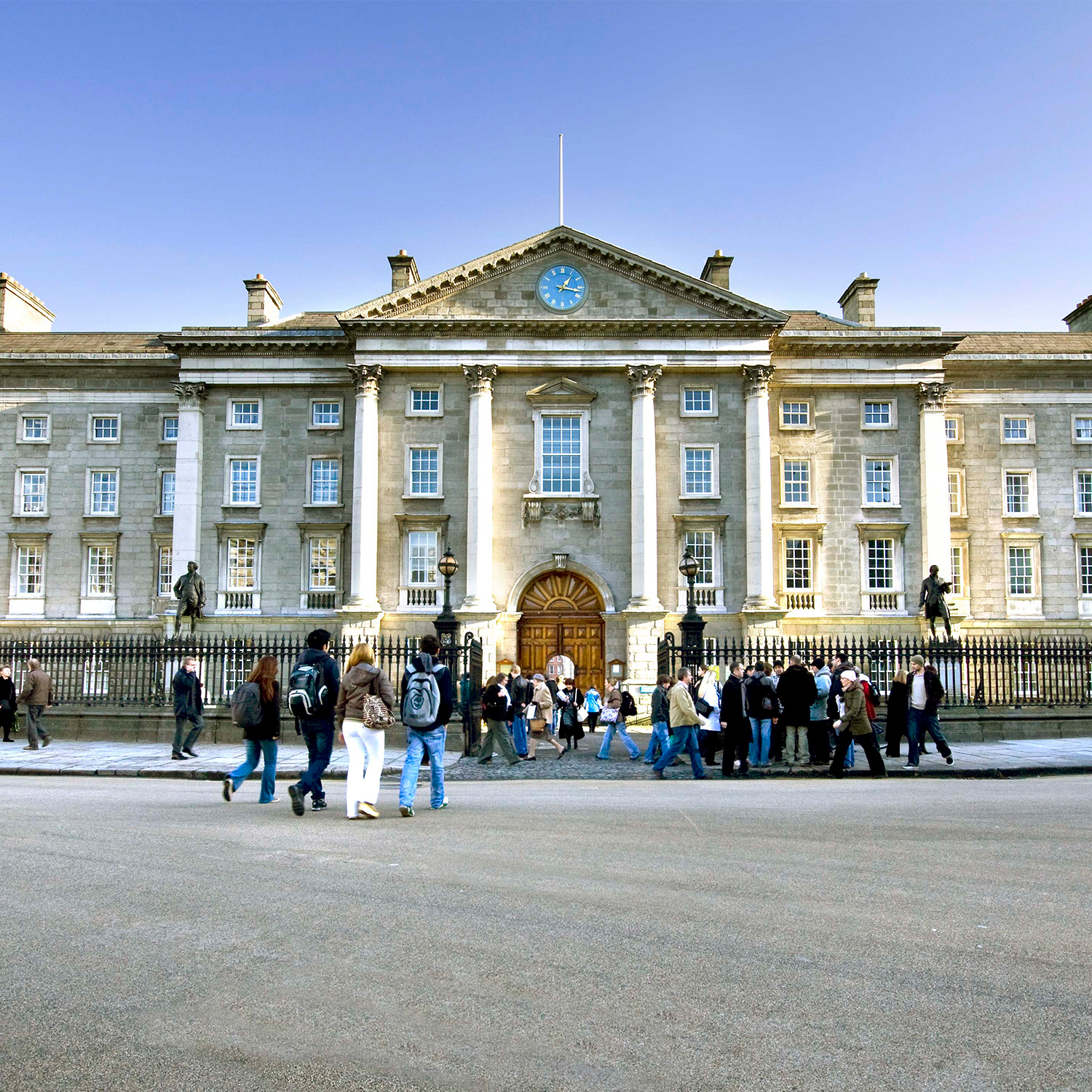Russia
Russia
Welcome to Trinity College Dublin, Ireland’s leading university. Prospective students from Russia can discover more about Trinity including contacts and equivalent entry qualifications for undergraduate and postgraduate study below. You can also register your interest to find out more.
International Foundation Programme Entry Requirements
Our International Foundation Programme is aimed at students who have the drive and ambition to attend a world-class educational institute, but cannot begin an undergraduate degree directly. Our International Foundation Programme is a year-long programme designed to allow students to develop the skills required to succeed and excel in a competitive university environment. To find out more about the Trinity International Foundation Programme, please visit this page.
To apply to the International Foundation programme, you will need:
English requirements:
- IELTS 5.0 with 5.0 in writing with no element below 4.5
- Duolingo English Test: minimum overall score of 80/160
English requirements for Law, Pharmacy and Psychology:
- IELTS 6.0 with no band below 5.5
- Duolingo English Test: minimum overall score of 90/160
Academic requirements:
- Attestat/11th grade - Minimum GPA 4.0 (all good or excellent grades)
Undergraduate Requirements
Trinity is delighted to accept students from Russia who have completed one of the international qualifications recognised by Trinity which are detailed below.
Accepted qualifications for direct applications include:
- GCE A Levels
- International Baccalaureate
- US High School Diploma with SAT or ACT
More information about accepted qualifications and entry requirements can be found in our Undergraduate Admission Guide for non-EU students.
If you do not have any of these qualifications, you may join Trinity through our International Foundation Programme.
In addition, to qualify for admission to a degree course at the University you must:
- Meet the minimum matriculation requirements (pass grades in English, Mathematics, a language other than English, and a full set of valid subjects for your examination system)
- Display a high level of competence in the English language in one of the examination systems recognised by Trinity College Dublin. Details on accepted English proficiencies are available here.
- Satisfy course specific requirements. Some courses will have additional requirements and restrictions for admission. They are detailed on the relevant course page.
- Meet competitive standards for admission to the course.
Please note that posted scores are minimum entrance requirements only and do not guarantee admission. Where places are competitive, a student must have excellent examination results to qualify for a place on their preferred course.
These standards are indicative only and final assessment will be made by Trinity's Academic Registry.
Important note on your application
Applicants from your country will normally be defined by Trinity as Non-EU applicants; this is based on residency rather than nationality.
Your EU/Non-EU status is an important part of your application and it is your responsibility to determine your correct status before making an application, as the method of application and requirements will differ.
Determining EU/Non-EU status (Undergraduate)
Making an Application
For detailed information on how to make an application to study at Trinity College Dublin, please see our How to Apply Guide.
There are many different ways to come to University and Trinity encourages applicants from all backgrounds and circumstances to apply. For more information on alternative paths to Trinity, such as advanced entry transfers please see our guide to non-standard applications here
Postgraduate Entry Requirements
Postgraduate work in Trinity is academically challenging and the University has high academic entry requirements.
Applicants will need to:
• hold at least a 2.1 honors degree from an Irish university or equivalent result from a university in another country.
Determining EU/Non-EU Status (Postgraduate) The fees you will be expected to pay to attend Trinity College Dublin are determined by a number of factors. For more information on how to determine your course fees, and methods of payment, please see our detailed information on Fees and Finances. Undergraduate Fees and Finances Postgraduate Fees and Finances For more information on scholarship, funding and grant opportunities, please see below. General Undergraduate Scholarships and Funding General Postgraduate Scholarships and Funding Scholarships for International Foundation Programme Study Do I need a Visa to come to Ireland to study at Trinity? The majority of non-EU/EEA students require a visa before entry to Ireland. To check to see whether you require a visa, please see here. Please see on the Irish Immigration Service website a list of the countries that require a visa before entry to Ireland.
• display a high level of competence in the English language in one of the examination systems recognised by Trinity College Dublin. Details on accepted English proficiencies are available on our Admission Requirements page
Some courses may require higher standards or require you to take further tests or attend an interview. More detailed requirements for each course are listed on the relevant course page
If you have questions about the specifics of the admission requirements for a given course, or about the course itself, you should contract the course coordinator directly using the contact information available on the courses page.Fees, Funding, Scholarships
Trinity College Dublin offers a number of scholarship opportunities for prospective and current students interested in study or research at Ireland's leading university. Since its foundation in 1592, Trinity College Dublin has sought to assist students of limited means and reward academic achievement. Students are always encouraged to explore external funding options in their home countries.Visas
For general information on visas and immigration please visit our Visa Information section.
Contact us
Student Testimonials
-
 Anastasia MarkovaInternational Law
Anastasia MarkovaInternational Law
RussiaIn my opinion, international experience is one of the paramount requirements in studying International Law, so, after graduation from Moscow State University of International Relations, I decided that it was time to move to another country. While choosing between various well-known universities all over the world, Trinity met all my personal criteria: it represents one of the top institutes for legal studies, can give me significant international experience, new colleagues and friends, and, moreover, is situated in a country that I like with all of my heart.
-
 Daria VoroninaGraduate: BA Economics & Sociology
Daria VoroninaGraduate: BA Economics & Sociology
RussiaI loved the campus, the architecture of Trinity and that it’s based right in the centre of the city. Having a vibrant student life with 200+ societies and clubs to suit anybody’s taste, interests and sports preferences really did make it for me. I went to karate, debating society, tried fencing, running, football, was a cultural officer in the Russian soc, etc. Trinity is a really cool, inclusive community, where you won’t feel lonely. What I also liked is that you’re surrounded by extremely smart and intelligent people, which is valuable as it makes you grow and expand your potential.





